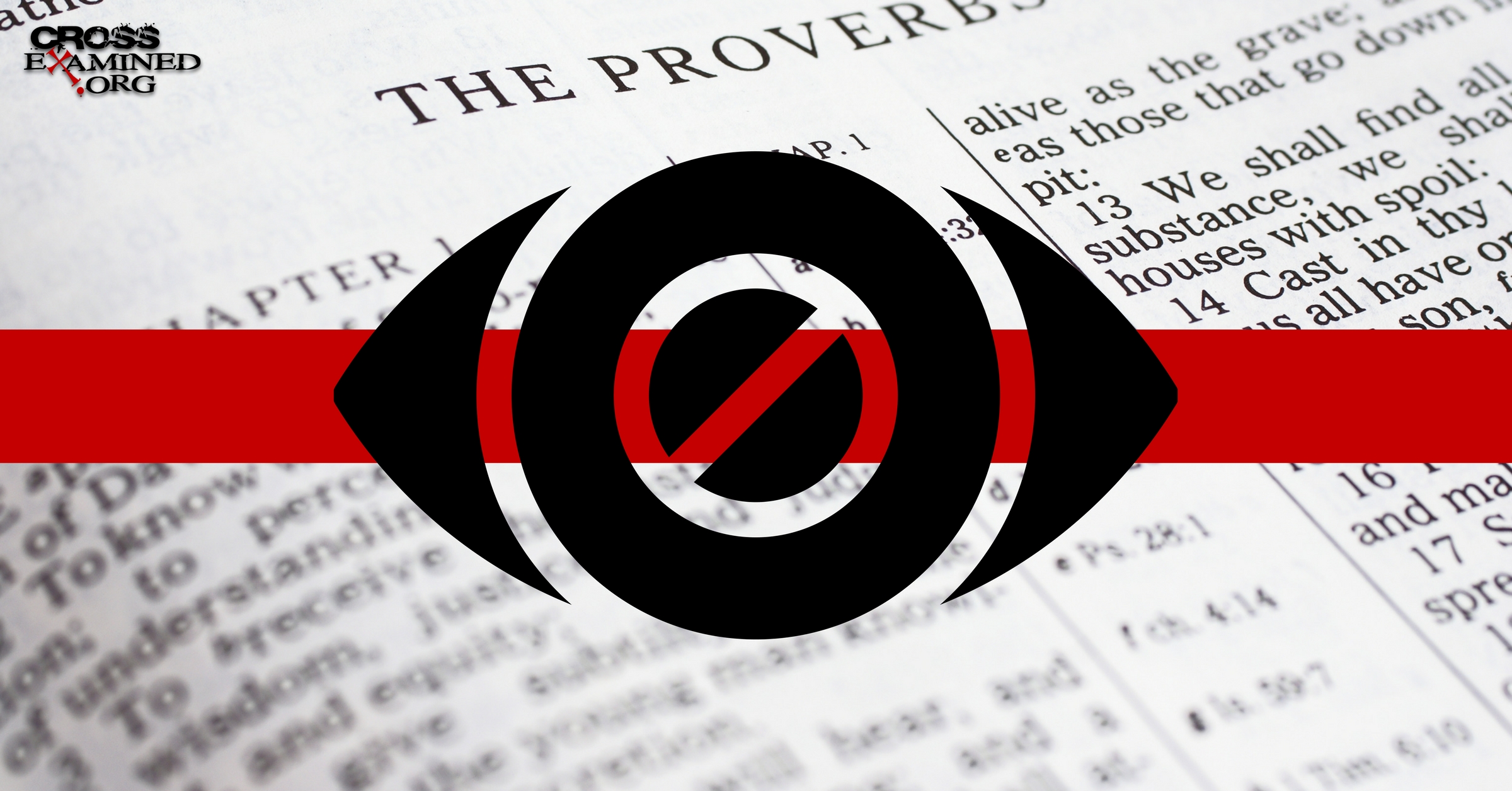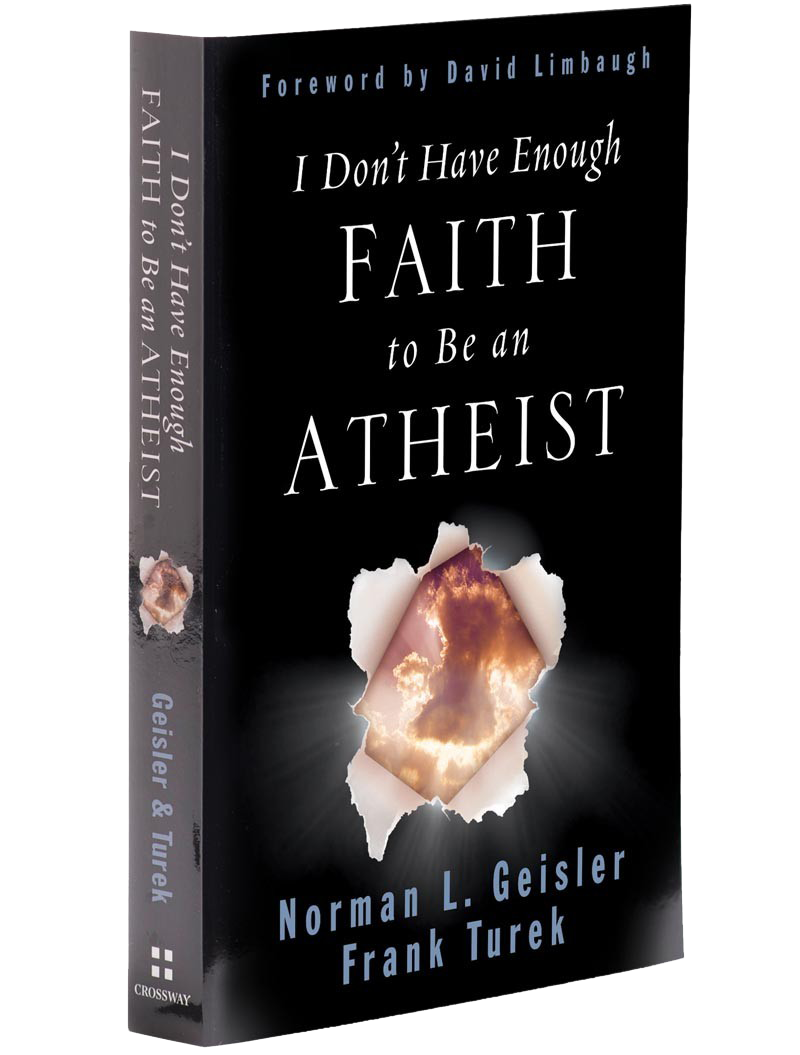By Evan Minton
In any debate or argument, it’s very important that you understand the terminology that your opponent is using and that your opponent understands the terminology that you’re using. If you don’t define your terms, you’ll just end up talking past each other and you’ll end up attacking straw men. As the philosopher, Voltaire put it: “Define your terms or we shall be like two ships passing in the night.”[1]
Often, you’ll hear atheists and anti-theists say things like “Christians don’t believe in science” or “Christians are anti-science!” or “You can believe in God or you can believe in science, but not both.” or “You can believe in The Bible or you can believe in science, but not both.” Atheists claim to be the champions of science and they deride Christians and Christianity for being opponents to science. But, in order to respond to the secularist’s claims, one has to ask a very important question: “What do you mean by that?” It’s one of the questions of The Colombo Tactic, a debate tactic talked about in Greg Koukl’s Tactics: A Game Plan For Discussing Your Christian Convictions.
What do you mean by that? What do you mean by “science”? What definition are you ascribing to that term? Because how the secularist is defining “science” will determine whether or not I agree with his claims. In my experience debating atheists on the internet and in real life, I have found that “science” can mean many different things to many different people, and when they claim “Christianity and science don’t mix” or “God and Science don’t go together” or “You can believe in The Bible or believe in science, but not both”, while all of the atheists are using the same words and are phrasing their arguments the same way, they don’t actually all mean to convey the same message.
It is the object of this blog post to look at the various definitions of “science” and talk about whether or not Christianity (and Christians by extension) are truly “Anti-Science”.
Definition 1: Science = Science Is The Only Way To Know Truth.
Some people confuse “science” with a philosophy called “scientism.” Scientism asserts that the only way to know what is true and what is not is through the scientific method. If you haven’t reached a conclusion through the scientific method, the conclusion can only be believed on blind faith or superstition. Scientism means that it can’t be known through science, it simply cannot be known.
If this is the definition of “science” that the skeptic says is incompatible with Christianity, then I would agree. Scientism and Christianity do not go hand in hand, for Christianity asserts that there are various roads to discovering the truth. For example, Romans 8:16 says that the way in which we know we are children of God is through the inner witness of The Holy Spirit. Hebrews 11:1 says “Now faith is confidence in what we hope for and assurance of things we do not see.”[2] We can know that we’re truly born again by The Holy Spirit witnessing to our hearts, telling us so. We can have confidence that God will always keep His promises by having faith in Him. Faith in Him is the evidence of what we do not see. What do we not see? His promises being fulfilled. We will see them in the future (e.g our entrance into Heaven because we placed our faith in Christ, Jesus’ return), but we don’t see them now. We trust that God will do what He says. Neither of these avenues to knowledge are through scientific means. The first is through spiritual, the second is through faith. One cannot be a Christian and believe that science is the only way to know truth.
On theological grounds, we must reject scientism. Since some atheists take scientism to be the same as science, they see a rejection of scientism as a rejection of science.
Of course, I would reject scientism even if I were not a Christian or even a theist at all. Why? Because the philosophy of scientism is logically self-refuting. A self-refuting claim is one that is refuted merely by asserting it. Such as examples would be “I can’t speak a word in English” spoken in English, or “My parents had no kids that lived” or “Everything I say is a lie”. If someone said to you “My parents had no kids that lived”, you would say “Well, that can’t be true. At least if they’re really your parents, since you’re alive.” If someone said “Everything I say is a lie”, you would know that if this statement is true, it’s false. If it’s true, at least one thing this person says is true, so not everything is a lie. But, if the statement is false, then it also isn’t true that everything he says is a lie since not everything he says is a lie. Either way, the statement cannot be affirmed without being undermined. If it’s true, it’s false, and if it’s false, it’s false.
Scientism is self-refuting in the same way. When someone says “Science is the only way to know truth”, I ask them “How did you come to that conclusion?” (another example of The Combo Tactic). How did you come to the conclusion that science is the only way to know truth? Did you come to that conclusion using the scientific method? How could the scientific method even be used to test that statement? What procedures would be involved in testing, scientifically, the claim “Truth can only be known through science”? The statement “Truth can only be known through science” is a philosophical statement, not a scientific one. It cannot be tested using the scientific method, and therefore, it collapses under its own criteria.
1: Truth can only be known through scientific testing.
2: Scientism cannot be known through scientific testing.
3: Therefore, scientism cannot be known.
For this reason alone, even atheists should reject scientism, at least if they want to remain logical. Are Christianity and Science opposites? Only if you’re using “science” as a synonym for “scientism”. But, by that definition, science and logic are opposites as well.
Definition 2: Science = An Old Earth and Darwinian Macro-Evolution
I’ve come to learn that one big reason Christians are labeled anti-science, why Christianity is seen as being undermined by science, and why belief in God and belief in science are seen as incompatible, is because many Christians reject the scientific consensus regarding the age of the universe and the validity of Darwinian macroevolution. Being anti-evolution is seen as being anti-science.
Now, first of all, there are many, many Christians who accept the various dating methods and agree that the Earth is 4.5 billion years old and that the universe is around 14 billion years old.[3] There are also Christians who accept Darwin’s theory of large-scale evolution and believe that that was the process God used to bring about all of life.[4] Where I stand on this issue: I don’t know. I am definitely an old earther of some sorts.
So, even given this definition of “Science”, it would only follow that some Christians are anti-science, but certainly not all. On this definition of “science”, only a portion would be anti-science. This charge wouldn’t affect Francis Collins, Deborah Haarsma, N.T Wright, Peter Enns, or others. They would not be opposed to science under this definition of the word.
Would The Bible be opposed to science? Well, this would depend on whether concordism is true or whether accommodationism is true. Does The Bible actually intend to teach us how old the universe is and the precise method and order God brought everything into being? If The Bible’s goal isn’t to convey cosmology or biology to us, but instead used the scientific understanding of its initial recipients (ancient Jews) to get theological and moral truths across, then even if we find scientific nonsense in The Bible, that would be no grounds for disavowing biblical inerrancy or concluding that scripture isn’t inspired. So which is it, concordism or accomodationism? Richard Bushey wrote an article he wrote making the case that God never intended to teach His readers science: see “Why The Biblical Flat Earth Model Doesn’t Flatten Christianity”.
For further reading, see “Hermeneutics 101 – Part 3: Understanding The Cultural Context” and my blog post “Why Did God Write A Book?”
There are many interpretations of Genesis that are compatible with an old earth and even evolution. For a treatment of The Day-Age View, I recommend reading Hugh Ross’ “A Matter Of Days”, for The Functional Ontological Interpretation of Genesis, read John Walton’s books “The Lost World Of Genesis One” and “The Lost World Of Adam and Eve”. Deborah and Loren Haarsma’s book “Origins: Christian Perspectives On Creation, Evolution, And Intelligent Design” is also a source I’d recommend.
Is God incompatible with evolution? No. Christians have always held that God can work through natural processes as well as through miracles. If a man goes into surgery, and people pray that the surgery goes well and it does, they don’t say “Well, God didn’t do it. It was the surgeon and his skills”. They would say something like “God guided the surgeons’ hands so that they wouldn’t screw up” or, if one is a Molinist, “God placed just these surgeons in these circumstances knowing that they would perform the surgery successfully”. For some reason, a lot of Christians just don’t apply that same reasoning to evolution. Evolution no more replaces God as an explanation for the existence of the animal kingdom than a vacuum replaces a maid as the explanation for why the floor is clean. Evolution doesn’t replace God as an explanation for why life exists any more than an oven replaces a chef as the explanation for how dinner was cooked. Evolution doesn’t replace God as an explanation for life any more than a surgeon replaces Him as an explanation for why a surgery went well.
Is evolution incompatible with the epistemological justification of God’s existence? I don’t see why that would be so. Biological design arguments aren’t the only arguments for God’s existence, you know. There’s The Kalam Cosmological Argument, The Cosmic Fine-Tuning Argument, The Local Fine-Tuning Argument, The Moral Argument, The Ontological Argument, The Argument From Desire, The Argument From Science’s Doability, The Transcendental Argument, and there’s plenty of historical evidence indicating that Jesus of Nazareth died on the cross and rose from the dead (see here, here, and here). All of these arguments are, in my judgment, sound, and none of them depend on the truth or falsehood of Darwin’s theory. One can concede evolution and all of these arguments would still need dealing with.
I’d like to point out though, that just because one is opposed to a scientific theory, that doesn’t mean one is anti-science. That would be like saying that because a Christian disagrees with a particular interpretation of a passage of The Bible that he’s therefore “Anti-Bible”.
Definition 3: Science as defined As Philosophical Naturalism.
If what one means by “science” is the philosophical worldview called Naturalism (i.e nothing exists but the natural, physical world), then Christianity is definitely incompatible and opposed to “science”. There’s no such thing as a naturalistic Christianity. Naturalism rules out anything supernatural, by definition. It doesn’t allow for God, angels, or demons, and since it doesn’t allow for God, it doesn’t allow for miracles, and since it doesn’t allow for miracles, it doesn’t allow for a bodily resurrection.
Christians, Christianity, The Bible, God, all of these are anti-science if science is used as a synonym for atheism.
Definition 4 and 5: Science = (A) Knowledge or a system of knowledge covering general truths or the operation of general laws especially as obtained and tested through scientific method. (B) Such knowledge or such a system of knowledge concerned with the physical world and its phenomena: natural science.
This is one of the definitions that Merriam-Webster’s dictionary gives. It defines science as “such knowledge or such a system of knowledge concerned with the physical world and its phenomena :natural science”[5] Definitely not opposed to this. I speak for myself and many others when I say that learning things about the universe is a good thing. I am very pro-science under this definition of the word, and many other Christians are as well. Some Christians are scientists themselves. In fact, historically, the scientists who made the most groundbreaking discoveries and ergo were remembered for generations held to the Christian worldview. Do names such as Isaac Newton, Blaise Pascal, Michael Faraday, Robert Boyle, and Johannes Kepler ring a bell? Modern day examples would include Francis Collins, who worked with the team that successfully mapped the human genome in its entirety. Under Marriam-Webster’s number 3, we can say that Christians are not anti-science. Christians have actually made great contributions to science.
I love learning science. I can’t get enough of it, to be honest with you. I initially dove into scientific research as part of my apologetics training (i.e to learn how to defend the Cosmological and Fine-Tuning Arguments), but as I learned more and more, I actually became interested in learning science for the sake of science itself. In fact, if I hope to some day buy all the seasons of How The Universe Works and Neil DeGrasse Tyson’s show Cosmos: A Space-Time Oddysee on DVD. I greatly enjoyed those programs.
I find the information in scientific books, journals, and TV programs fascinating. Not only that, but I consider it a form of worship. Jesus said to love God with all of our minds (Matthew 22:37). To learn how creation ticks is one way to pay this intellectual homage Jesus was talking about. When I hear scientists on TV talk about what goes on inside of a star, I cannot help but think “What an awesome God I serve! He made that!”. When I hear of astronomers describe the conditions on Saturn’s moon Titan, even if I never open my mouth, I at least inwardly praise God for making such a fascinating system. Even with evolution, If I fall off this fence I’ve been sitting on, I would say alongside Charles Kingsley, an Anglican Priest, and a friend of Darwin: “We knew of old that God was so wise that He could make all things; but behold, God is so much wiser than that, that He can make all things make themselves.”[6] I believe God loves science, and I believe it makes Him happy the more we learn about this big, beautiful world He created. When the Higgs-Bozon (a.k.a The God Particle) was discovered, I saw a meme that was captioned “‘Hey scientists, thanks for finding my particle’ – God” and although it was intended to be humorous, I personally think it reflected the truth. When Higgs first predicted that such a particle existed, I can imagine the Father turning to The Son and saying giddily “This particle We created, they’re close to finding out about it!” I like to think of it as like a father giving his children a large jig-saw puzzle, then he sits back and watches in gladness as His children piece together more and more, getting a fuller picture the more pieces they successfully fit together.
When I use the word science, I never use definitions 1-3. I always use 4 and 5: “(A) Knowledge or a system of knowledge covering general truths or the operation of general laws especially as obtained and tested through scientific method. (B) Such knowledge or such a system of knowledge concerned with the physical world and its phenomena: natural science.” Christians, Christianity, The Bible, God, none of these are incompatible or opposed to science by these meanings of the word. And if you’ll click the link in Footnote number 5, I think you’ll find the Christian worldview isn’t incompatible with any of the other 3 definitions Marriam-Webster gives either. It is certainly incompatible with some of the definitions secularists often ascribe to it.
Conclusion
“Christians are opposed to science!”, “God and Science and mutually exclusive”, “You can believe The Bible or science, but not both.”. To my Christian readers, when you hear these statements, you need to first understand what they mean by the word “science”. Do they mean “Scientism”? Do they mean acceptance of an old earth and evolution? Do they mean it as a synonym for atheism? Or do they use it to mean an investigation into how the universe works? Depending on what they mean by it will determine what kind of response you should give. Not getting a definition out of them will likely result in you and the atheist talking past each other. Does he mean the same thing as you do when he says the word “science”? Find out. Ask the question “What do you mean by science?”
Footnotes
[1] Or at least he’s been attributed as saying this. It is uncertain whether he ever did.
[2] I don’t believe that Hebrews 11:1 is teaching blind faith. Fideists will use the verse this way, but I really don’t think that’s what the verse is actually saying. For one thing, the context of this verse includes examples of people who had very strong evidence for God’s existence (e.g Abraham, Moses) and praises them for their great faith. Hebrews 11 is a sort of “Faith Hall Of Fame”. Faith is a synonym for trust. To have faith in God means to have trust in God. You can trust in God while having evidence for His existence. Inversely, you can have evidence for God’s existence and not trust Him at all (cf. James 2:19).
[3] Most of the Christian Apologists I’ve learned from over the years are Old Earth Creationists, such as Lee Strobel, William Lane Craig, Hugh Ross, Frank Turek, Norman Geisler, J. Warner Wallace, Sean McDowell, and Neil Mammen. While they reject evolution, they do agree that the universe and Earth are billions of years old, and would agree that young earth creationism defies sound science. For those interested in this position, I suggest Reasons.org. Also, see my blog posts on this on the “The Creation Controversy” page.
[4] These Christians call themselves Evolutionary Creationists. For those interested in investigating this position, I suggest BioLogos.org.
[5] https://www.merriam-webster.com/dictionary/science
[6] Charles Kingsley, The Natural Theology Of The Future, 1871
Original Blog Source: http://bit.ly/2yXQsPo











 http://bit.ly/IDHEFTBAA_IA
http://bit.ly/IDHEFTBAA_IA http://bit.ly/2auZckZ
http://bit.ly/2auZckZ